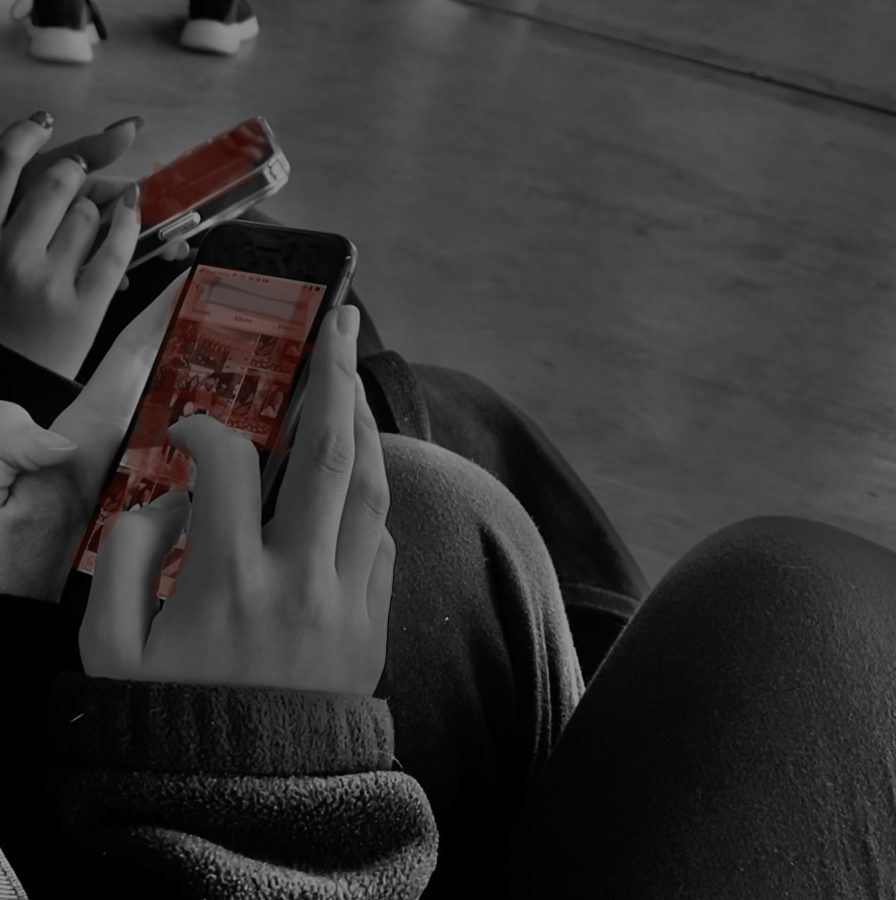Social media: the silent killer
Being online can be destructive, addicting
Photo illustration shows two students scrolling through social media during school.
March 31, 2023
Surveys show that the average high school student spends up to five hours each day on social media out of the 7-12 hours spent awake. That’s one third to half of our lives. When you consider we live 77 years on average, that’s a few decades of our time. Is social media slowly wasting our lives away? Is it affecting our world more than we think it is?
Social media is a relatively new concept being invented just over 20 years ago, so the true answer may be unclear. Despite this, the few studies and surveys that have been conducted say many worrisome things about the uses of social media and how it can be devastating in ways that we did not originally foresee.
While in the spur of the moment, most of the media that we scroll through each day may make us laugh and feel good, but what we do not see is how it can be addicting and how it is silently changing the trajectory of our lives, possibly for the worse.
Since the COVID-19 outbreak in 2020, social media use has increased by nearly 61%. Alongside the use of social media spiking to extreme levels, so has the probability of suicide and depression amongst teens since COVID hit America by surprise.
“According to the CDC, teenage emergency room visits for suicide attempts increased significantly during the pandemic, with a 50% rise in cases in females and almost 4% increase in males,” says Taylor Rosenbaum, M.D., pediatrics resident with Baylor College of Medicine and Texas Children’s Hospital, in her article published at the end of 2021.
The reason behind the dangers
It is believed that the relationship between suicide rates and social media usage is in fact connected. There is in reality some science behind this belief to prove its probability.
As we scroll through videos and posts, a chemical in our brain called dopamine is activated. The chemical provides temporary happiness. In theory, it’s a good thing, but truly it is not. It’s the same chemical that is linked to the feeling that we get from drug and alcohol abuse.
When our phones get put down and we choose to stop scrolling, our brains begin to long for that happy feeling once again, so we feel the intense need to pick the phone back up and keep scrolling, almost like an addiction.
“As the brain is repeatedly flooded with dopamine from unhealthy activities such as substance use, it will begin to reduce its own natural production of the neurotransmitter and leave a person feeling depressed or anxious,” say experts from the Summit Malibu Treatment Center on their website.
After such a long time fighting the invisible battle of dopamine addiction from the wrong places, one begins to feel a strong sense of repetition. Every day feels the same as the last, likely because we begin to find happiness in a truly harmful thing.
One may become oblivious to the real world, and one’s sense of reality can become altered. Social media can evolve into something deadly when it becomes our lives, when it becomes who we are.
Many companies have began to pass laws limiting children’s and teenagers’ use of social media, including time limits on the apps. So this means that even the people that make a profit off social media users know that it’s a problem. I think that this is a message to us all that maybe it is time to realize how this bad habit is, and how it’s not really benefiting us at all.
The solution to this problem
As humans, we still require dopamine to avoid mental illnesses and regulate our bodies properly, so where can we get it from that doesn’t ultimately harm us as social media does?
We get dopamine naturally from going outside, eating healthy foods, getting a good amount of sleep, spending time with people we love, and many more related things.
We can prevent the brokenness and mess that excessive social media use can cause by simply putting our devices away, waking up from the trance, each day, and getting out and being with people we care about.
All that we see on social media tells us that we aren’t good enough–we see what our lives should look like, what we should look like, and that consumes us.
The media is so overwhelming and stressful that when we get involved in it, time begins to fly past us. At the end of the day, our brains can’t even remember the majority of the videos that we saw. We miss the keys signs in life that point us toward growth, the signs that we are barely holding on to what we know as life, the signs that, that one person that you love isn’t as happy as you think they are.
Human life is not very long. We should take time and enjoy the good things of this world while we still can. Tomorrow is not promised, so let’s not get lost in our devices. We need to realize that so much exists outside of what we know. There is a whole big world out there that we take for granted.
If we just open our eyes to what life truly can be and not what social media says it is, then maybe our world would become a better place and people would be guided toward real happiness. I believe that we can all make a difference. We just have to try.
